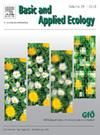气候变化对北方植物与传粉者相互作用的影响在很大程度上被科学所忽视
IF 3.5
2区 环境科学与生态学
Q2 ECOLOGY
引用次数: 0
摘要
北方森林是世界上最大的陆地生物群落之一,目前正经历着气候驱动的快速变化。本文综述了气候变化对北方植物传粉者系统影响的有限研究,揭示了一些知识空白,并揭示了北方生态系统的脆弱性。使用四个互补的Web of Science搜索,我们发现了5198篇文章,其中只有11篇是相关的。我们的研究结果表明,迄今为止,对北方地区植物与传粉者相互作用的研究是有限的,我们对北方地区昆虫动物群和传粉系统的了解也是有限的。现有的研究往往集中在显眼的植物上,而忽视了许多其他具有重要生态意义的物种。此外,目前的研究往往缺乏传粉媒介物种的详细数据,这限制了我们评估特定植物-传粉媒介相互作用对气候变化的脆弱性的能力。例如,大多数文章使用植物繁殖成功作为传粉者有效性的代理,而不考虑传粉者的身份。这种方法成功地评估了植物的整体适应性,但忽略了传粉者群落的变化,例如由热干燥引起的变化,这可能与预测气候变化的影响有关。此外,传粉者分类群似乎影响植物繁殖对变暖的反应,苍蝇授粉的植物似乎比蜜蜂授粉的植物更能适应温度变化。未来的研究应优先考虑对北方传粉生态至关重要的基础植物物种和关键传粉媒介,包括苍蝇。了解物种对变暖的特定反应对于确定哪些物种及其相互作用最容易受到气候变化的影响同样重要。研究还应审查森林小气候的作用,因为它们可以在更广泛的气候变化期间缓冲北方地区,帮助减轻变暖对这些生态系统的影响。解决这些差距对于预测气候对北方生物多样性的影响,以及为支持生物多样性和造福依赖北方生态系统服务的人类社区的保护战略提供信息至关重要。本文章由计算机程序翻译,如有差异,请以英文原文为准。
The effects of climate change on boreal plant-pollinator interactions are largely neglected by science
The boreal forest, one of the world's largest terrestrial biomes, is currently experiencing rapid climate-driven changes. This review synthesizes the limited research available on climate-change impacts on boreal plant-pollinator systems, revealing several knowledge gaps and shedding light on the vulnerabilities of boreal ecosystems. Using four complementary Web of Science searches, we found 5198 articles, of which only 11 were relevant. Our findings reveal that research on boreal plant-pollinator interactions is limited to date, as is our understanding of the insect fauna and pollination systems in the boreal region. Existing research often focuses on conspicuous plants, neglecting many other ecologically significant species. In addition, current studies often lack detailed data on pollinator species, which restricts our capacity to assess the vulnerability of specific plant-pollinator interactions to climate change. For example, most articles use plant reproductive success as a proxy for pollinator effectiveness without considering pollinator identity. This approach successfully assesses overall plant fitness, but overlooks changes to pollinator communities, such as those resulting from thermophilization, that may be relevant to projecting climate-change impacts. Moreover, pollinator taxon seems to affect the responses of plant reproduction to warming, with fly-pollinated plants appearing to be more resilient to temperature changes than bee-pollinated plants. Future research should prioritize foundational plant species and key pollinators, including flies, which are crucial to boreal pollination ecology. Understanding species-specific responses to warming is equally important for identifying which species and interactions may be most vulnerable to climate change. Studies should also examine the role of forest microclimates, as they may buffer boreal regions during broader climatic shifts, helping to mitigate the impacts of warming on these ecosystems. Addressing these gaps is essential for predicting climate impacts on boreal biodiversity and for informing conservation strategies that support biodiversity and benefit human communities reliant on boreal ecosystem services.
求助全文
通过发布文献求助,成功后即可免费获取论文全文。
去求助
来源期刊

Basic and Applied Ecology
环境科学-生态学
CiteScore
6.90
自引率
5.30%
发文量
103
审稿时长
10.6 weeks
期刊介绍:
Basic and Applied Ecology provides a forum in which significant advances and ideas can be rapidly communicated to a wide audience. Basic and Applied Ecology publishes original contributions, perspectives and reviews from all areas of basic and applied ecology. Ecologists from all countries are invited to publish ecological research of international interest in its pages. There is no bias with regard to taxon or geographical area.
 求助内容:
求助内容: 应助结果提醒方式:
应助结果提醒方式:


